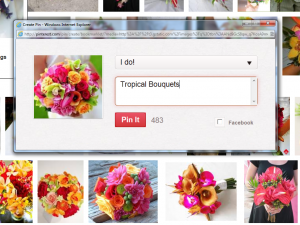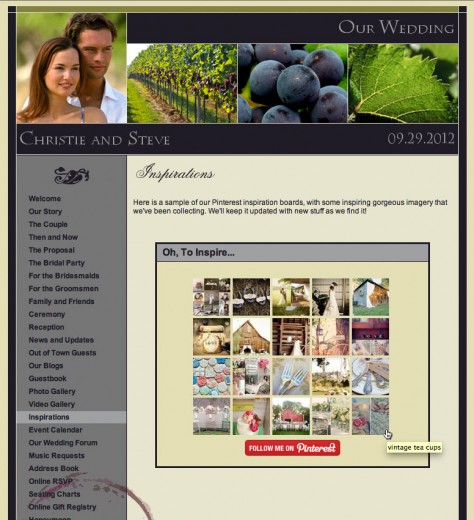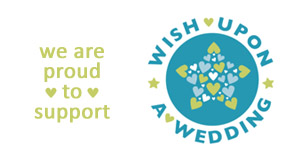Inspiration boards. Crafts and DIY projects. Meal ideas. Attire. If you need it in your wedding, you can find great examples on the web. And if it’s on the web, you can add it to your own virtual online pinboard with Pinterest. Others can follow and re-pin your pins. You can do the same to theirs. Pin. Comment. Repin. It can quickly get addicting.
Earlier this month, bride-to-be Lauren posted an article on GeekWire describing all the ways Pinterest helped her plan her big day, and she called it a lifesaver. “Pinterest could quite possibly be one of the greatest idea organization tools out there,” she says.
It’s fun, convenient, and a boon for wedding planning…a win-win-win, right? Over 11 million recent members would seem to think so. Pinterest has only been on the scene for a number of months but is already the 16th most visited site on the Internet. WedShare even recently introduced a website app that lets you integrate Pinterest boards right into your wedding website pages.
However, there is a potential problem lurking in the very foundation of what makes Pinterest so appealing. All this sharing and re-sharing is great, except that it conveniently overlooks the issue of image copyright, copyright infringement, and cases where original content owners don’t want their work posted outside their control and permission. And as it currently stands, if a lawsuit or series of lawsuits were to be brought, it looks as if the onus could be on you, the pinner. Not on Pinterest.
I know. Major buzzkill, isn’t it? So what’s going on here?
Last month a blogger, attorney, and (formerly) avid Pinterest user named Kristen posted an article detailing her reservations of using the service. The article quickly went viral. In it, she points out how Pinterest’s terms and conditions put users into the position of being held solely liable for any unintentionally illegal posting. In fact, she states that if a lawsuit were to emerge, not only would you have to pay for your own attorney and legal fees, but those of Pinterest as well.
So how vulnerable are you as a Pinterest user? Unfortunately, there’s no clear answer at this point, and only time will tell. To pin or not to pin others’ work is a personal decision that every member will have to make. Not everyone shares Kristen’s view: some point out that the site is covered by the fair use defense, and that it is considered a “safe harbor” due to the option provided to flag and report content for removal, which has offered protection to other media sharing services like YouTube and Facebook. Further, use of others’ photos on Pinterest is usually non-commercial, and can even drive a substantial amount of traffic back to the content’s original source…all points that would seem to lessen the threat of legal action by content owners.
A good recommendation: always credit the source. Anthony Falzone of the Stanford Center for Internet and Society (quoted here), says “There is a dimension of hurt feelings and injustices. If users were careful about finding what the original source is and providing a credit or a link back to the original that would go a tremendously long way to placating these concerns.”
Earlier this month, Pinterest’s cofounder Ben Silbermann contacted Kristen to discuss her misgivings after her article went viral. Apparently, the conversation was amiable and positive; “He wants to figure out a way to make ‘his little web page’ (which he said his Dad calls it — I thought that was cute) work within the confines of the law AND in a way where photographers and every user feels comfortable,” Kristen wrote (quoted here).
Another effort Pinterest has undertaken to stay in the light is its so-called “kill switch”, which allows websites to opt out of the whole pinning thing altogether, preventing their imagery from being shared over the service–or at least making it difficult to do so. This feature garnered much attention when it was adopted by the photo service Flickr.
I’ll provide any updates as I find them, and I truly hope that the evolution of this service is smooth and remains in the interests of all parties. To be honest, I’m quite optimistic. I see positives for both content providers and content users. How about you?
Images by GeekWire and Popular Photography Magazine









Goodness. I think we should all be careful – it’s a shame that we can’t share to our hearts’ content but we should also spare a thought for the people who put time and effort and art into whatever we share without thinking and acknowledgement I guess.